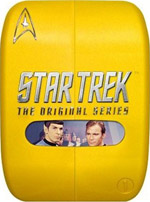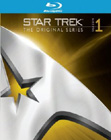The Menagerie
This is the only two-part story in all of the original Star Trek, and it represents
a bit of a clever stunt to make use of the extensive high quality footage
of the original pilot and its alternate cast while still incorporating them into
something that features Kirk and our now regular crew. I salute the concept
and regard it as a worthy one. Indeed, because this was done, we can consider
all the events of that
first pilot "The Cage" as being canon events that actually
happened. Plus, this now becomes sort of a sequel. Nice.
For those of us who do watch Star Trek in production order and start with "The Cage",
this two-part expanded version winds up feeling like a bit too much of a re-run,
and one that has come a bit too soon, which is a shame.
Indeed, it's mostly the new bits with Kirk and Mendez and McCoy
that hold our interest now, and this review will be a bit more heavily slanted
towards their material. The alternate ending also holds additional interest,
and is key to our decision about which of the two versions of this story is
the superior one.
Part One of this story really does a tremendous job of hooking the audience
and making us desperate to learn all the secrets regarding what really happened
on Pike's adventure during "The Cage", and also exactly what is going on in Spock's
head now that is related to that. The audience gets everything it needs to be
on the edge of its seat in that regard. However, time and again, the answers
that unfold during Parts One and Two
seem to indicate that the tension was all a bit artificial to begin with.
The new parts of "The Menagerie" are an exciting bit of fluff
when all is said and done.
It's bizarre to count the number of times that the court proceedings stop or come
to a deadlock, seemingly permanently, and then after a commercial break,
everything continues as though the reason for the previous halting never existed.
Why is Talos 4 declared forbidden with death-penalty severity? How is it that
Spock would be a key party to making that recommendation, and then decide to
break such a rule on his own whim, against Pike's wishes? There seems to be a bit
too much flip-flop here on how Starfleet has come to see the Talosians or trust
their motives. If there is such huge mistrust by Humans regarding what the Talosians
might make us believe through illusion, would the real Commodore Mendez
sitting on Starbase 11 suddenly waive all charges upon seeing the transmissions
of "The Cage"? The last time Starfleet got all that same info, via Pike and Spock's
reports, they put the death penalty on any contact with the planet.
Once we the audience see that there's nothing much in Spock's head other
than what we've seen in "The Cage" already, plus a bit of a compassionate
desire to play matchmaker, we can look at the whole thing here,
and having had that good think on it,
I'm not sure I buy the mutiny and legal debacle presented in total here.
Spock has really become quite a softie, and the inconsistencies
don't quite seem to be in character.
Part One largely works, in part because it can leave many of the questions
dangling without having to answer for them, and I think because the earliest
bits of "The Cage" that feature here have a lot of Mr. Spock in them and
fit nicely into the escalation of all the questions that get asked here.
Starbase 11 is a neat place to visit, where the mystery can entertain us,
and the Enterprise getting hijacked by a crewmember would become a
staple entertaining tactic for future episodes to come in this show and its spinoffs.
The ensuing chase with the shuttlecraft is another nice twist,
and not so commonly copied. All quite good stuff that keeps this "sequel"
lively and worthy on its own.
Part Two gets a nice pre-title recap to recharge the concept and the main ideas,
but doesn't work too well after that. Too many of the dangers and transgressions
of the first part seem to have evaporated. Additionally, it's a bit frustrating
to see so much of "The Cage" being chopped up, with nice bits of dialogue or
sometimes whole scenes going missing, and music cues that previously played
at full length getting all mangled. It's nerve-grating. Typically, as I watch
part two, I really wish I was watching the original version of "The Cage" instead.
It works so much better, and what few scenes of Kirk and company there are,
they really seem to be struggling to justify their existence.
However, I'm not sure to what extent we owe this later version "The Menagerie"
credit for the multiple roles that Malachi Throne plays in these stories.
Most obviously,
he's on screen here playing both the real Commodore José Mendez
and his illusionary duplicate. However, he also took a turn at re-voicing
the Keeper. It seems he originally did the Keeper's
voice on the first version of the Cage - which you can still hear in its natural
form on the black-and-white footage in the clumsily patched together version
of the pilot. However, the voice clearly changed thanks to post-production on
"The Menagerie", becoming the version we all now remember.
I believe Throne's voice was merely reprocessed through a harmonizer or
some other filtering device....
Indeed, I've been able to take Throne's deeper voice from the black and white footage,
raise it up in pitch by 4 semitones while preserving its original length,
and presto - it's the voice of the Keeper as heard on the equivalent section
of colour footage on the restored version of the Cage. Equally, the process
can be reversed on parts of the Keeper's speech that only appear in the final form,
and once again Throne's natural voice is the result.
Indeed, by casting Throne as Commodore Mendez, they could be sure to get him to also
do that extra bit of new dialogue here, with the Keeper calling Captain Kirk by name.
For my money, a cool voice, processed with a bit of reverb or whatever,
was and is often as exciting a special effect as any laser beam or explosion,
so I LOVED the fact that the Talosians sounded that way every time they spoke.
We know also that "The Cage" inherited one or two extra musical cues, due to
being incorporated into "The Menagerie" and then restored back to its original
running length. Indeed, if they only had to reprocess Throne's voice to get
the version of the Keeper that we all know, it would be easy enough in 1988
to duplicate that process on those portions of "The Cage" that didn't make it into
"The Menagerie" at the time.
Perhaps post-production on "The Cage" is so good in part because
the team had those multiple chances at it, in 1965, then 1966, then 1988.
All to the good.
It is curious that, in Part Two of "The Menagerie"
Vena's Orion girl dance was considered threatening enough to make a good
commercial break cliffhanger, with additional commentary from Kirk, and some
extra distance from the audience via inlaying the footage on the court's screen.
If there's one good thing still driving part two, it's the fact that we know
Kirk's Enterprise is headed for Talos 4, and anything we learn on the screen
might give Kirk a heads-up on what to expect and how to deal with things
once he arrives.
But "The Menagerie" doesn't really leave itself much space to conclude as a sequel.
Once it ceases recapping the events of "The Cage", it's got only about 3 minutes left
to wrap itself up and bow out. Though it manages to successfully copy the tone
of the ending of "The Cage", in part by re-using the exact same musical cue
and re-purposing some of the same dialogue, this new twist on the ending gives
us much cause to hold back a few points.
Most noticeable of all is that we now witness Captain Christopher Pike's personal
choices making an absolute 180 degree turnabout from what they were last time in
"The Cage". We no longer get the concept that the adventure rejuvenated his spirits
and helped him embrace reality with renewed vigour. He now gives in to the
almost narcotic pull of fantasy, without any hope of return. Bummer.
In some ways, Kirk is now presented as the character who will "choose" and enjoy
reality, which isn't very effective or satisfying, since Kirk hasn't really
been much of an active player in anything of significance here, and isn't
really making a "choice" here by any means.
In some sense though, the "choice" for Vena is now a bit less of a pure fantasy,
and a little bit closer to reality, since she actually does have her man this time.
But, she doesn't exactly get him in the same condition that she originally wanted,
and one can only expect that a high degree of fantasy will still prevail in
their interactions.
The only real consolation occurs when audience members look at a loftier layer,
and see that, once again, both fantasy and reality are meant to be celebrated here,
and each "choice" is worthy. If you can get that, the somewhat reversed ending on
"The Menagerie" can still work quite nicely. But, all things considered,
I still believe "The Cage" pulls off that message with more power and
greater finesse.
There are still some gaping holes here. Having seen how far technology has come
in the 50 years since this episode was made, it's yet another stretch to think
Pike couldn't be wired up directly to have some kind of access to both computers
at large, and some mechanical appendages as well. As is, it would be child's
play to upgrade his yes/no brain output to both Morse code and a form of
binary computer input - and from there, the sky's the limit, even if his
new learning curve is to be a very slow one at first. Also,
where the Dickens are the rest of his family, friends, and loved ones?
How is it they have no say in anything that happens here? There could be
much, much more to explore here, if only "The Menagerie" wasn't so focused
on being a vehicle for presenting past footage.
At any rate, this is still a much more positive ending than most other episodes
before this one have achieved. As we do get to see a happy couple re-united,
I'd say the ending of "The Menagerie" lands more towards the smiling side of neutral,
if not quite upbeat.
During a 25th Anniversary marathon of TOS's top ten episodes as chosen by fans,
the two episodes of "The Menagerie" managed to take positions 7 and 8,
mostly I would guess on the enormous strengths of "The Cage". But,
since we now live in an age when "The Cage" is widely available in its original form,
I think "The Menagerie" will have to take a bit of a hit for offering duplicate
content in an inferior form. I like this story, but I won't be ranking it
quite so highly in my list of all time Star Trek favourites.
Read the next Star Trek review:
"The Alternative Factor"
|
|














